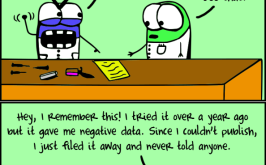RCT — a questionable claim of establishing causality The ideal RCT is the special case in which the trial’s treatment status is also assigned randomly (in addition to drawing random samples from the two populations, one treated and one not) and the only error is due to sampling variability … In this special case, as the number of trials increases, the mean of the trial estimates tends to get closer to the true mean impact. This is the sense in which an...
Read More »The role of RCTs in development
The role of RCTs in development .[embedded content]
Read More »Econometrics — science based on unwarranted assumptions
Econometrics — science based on unwarranted assumptions There is first of all the central question of methodology — the logic of applying the method of multiple correlation to unanalysed economic material, which we know to be non-homogeneous through time. If we are dealing with the action of numerically measurable, independent forces, adequately analysed so that we were dealing with independent atomic factors and between them completely comprehensive,...
Read More »Causal inference in social sciences (student stuff)
Causal inference in social sciences (student stuff) .[embedded content]
Read More »The main ideas behind bootstrapping (student stuff)
The main ideas behind bootstrapping (student stuff) .[embedded content]
Read More »Propensity score matching vs. regression (student stuff)
Propensity score matching vs. regression (student stuff) .[embedded content]
Read More »Questionable research practices
.[embedded content]
Read More »Bradford Hill — comment trouver de la causalité dans des corrélations
Bradford Hill — comment trouver de la causalité dans des corrélations .[embedded content]
Read More »How to achieve ‘external validity’
How to achieve ‘external validity’ There is a lot of discussion in the literature on beginning with experiments and then going on to check “external validity”. But to imagine that there is a scientific way to achieve external validity is, for the most part, a delusion … RCTs do not in themselves tell us anything about the traits of populations in other places and at other times. Hence, no matter how large the population from which we draw our random samples...
Read More »Randomizations creating illusions of knowledge
Randomizations creating illusions of knowledge The advantage of randomised experiments in describing populations creates an illusion of knowledge … This happens because of the propensity of scientific journals to value so-called causal findings and not to value findings where no (so-called) causality is found. In brief, it is arguable that we know less than we think we do. To see this, suppose—as is indeed the case in reality—that thousands of researchers...
Read More » Heterodox
Heterodox




